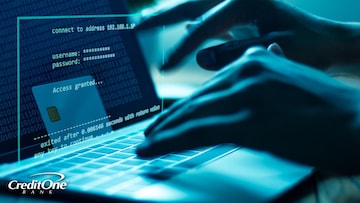
What a Credit Freeze Is and How To Freeze Your Credit Reports
January 02, 2025
If your identity is stolen, how can you protect yourself and your personal data? A credit freeze restricts your credit report to prevent unauthorized activity.

Introduction
You may have heard stories about security breaches and hacked databases at major corporations, with the personal information of unsuspecting consumers ending up on the dark web. And it seems like we’re constantly seeing new warnings about the latest scams and current twists on identity theft.
While you can take precautions against having your identity stolen, it’s always a good idea to have a backup plan in case your personal data does fall into the wrong hands. If the unthinkable occurs, one strategy that may help is freezing your credit.
What Is a Credit Freeze?
A credit freeze, also called a “security freeze,” restricts access to your credit reports. Freezing your credit makes it difficult for anyone to open a new account in your name, because lenders generally check your credit before issuing a loan or credit card. If they can’t pull your credit report because it’s frozen, you’ll likely be denied — which is great if the person trying to open the account is someone other than you.
On the other hand, if you want to apply for a loan or line of credit yourself, you’ll have to lift the freeze (or “thaw” your credit) until your application is complete.
Freezing your credit doesn’t affect your existing accounts or impact your credit score. However, continuing to monitor your credit reports after freezing helps ensure that they’re still accurate. By law, you’re entitled to a free copy of your credit report from each of the three major credit reporting agencies every year, but you can now get them every week at AnnualCreditReport.com.
How To Freeze Your Credit
Freezing your credit requires contacting each of the three major credit bureaus — Experian, Equifax, and TransUnion. Doing it through only one of these agencies won’t freeze it with the other two, so it’s important to repeat the process with all three.
You can submit your request online, by phone, or through the mail. If you do it online or over the phone, the credit reporting agency needs to place the freeze within one business day. If you make the request by mail, their deadline is three business days after receiving your letter.
What Information Do You Need To Freeze Your Credit?
You need to provide proof of your identity before a freeze can be put on your account. Each credit bureau might have slightly different requirements, but expect to give them some or all of these standard documents or pieces of information:
- Full name
- Date of birth
- Current address
- Other addresses used during the past two years
- Social Security number
- Driver’s license or other government-issued ID
- A recent utility bill or bank statement
You’ll also probably need to create a PIN. This number will be required later, when you want to lift the freeze — either temporarily or permanently.
Who Can View Your Frozen Credit Report?
When your credit report is frozen, it’s not completely invisible to everyone. You can still see it, along with select professional organizations and other third parties:
- Current creditors
- Credit bureaus
- Credit monitoring services
- Creditors offering pre-approval
- Collection agencies
- Fraud investigators
- Background screening companies
- Government agencies and courts
That might seem like a lot, but government agencies will typically only have access if they’re responding to a search warrant, subpoena, or court order. The others are generally doing soft inquiries that you might benefit from.
On the other hand, unofficial requestors, consumers, relatives, and creditors performing hard pulls will be prevented from viewing your credit report. Most importantly, identity thieves and other scammers shouldn’t be able to access it.
Does It Cost Anything To Freeze Your Credit?
Since 2018, it’s been free to freeze and unfreeze your credit in all 50 states. Before that federal law was implemented, it could cost you up to $12 every time you wanted to place or lift a security freeze.
A credit lock, on the other hand, is an optional subscription service that may come with a fee. So always make sure you ask for a credit freeze if you don’t want to pay. On the other hand, a credit lock may happen instantly, so if time is of the essence, it’s worth exploring that option. Credit locks usually also come with additional features, like real-time alerts every time someone requests access to your locked report.
How To Unfreeze Your Credit
Unfreezing your credit is also known as thawing or lifting the freeze. If you want to apply for credit after freezing your credit report, you’ll need to lift the freeze first, so the lender can process your application in a timely manner.
Just like with freezing your credit, unfreezing can be done online, over the phone, or by mail. And while freezing it can happen within a day, thawing it can be as quick as one hour. Kind of like those ice cubes that take all night to make in your freezer, but melt quickly in your beverage.
To unfreeze your credit, you’ll need to provide the PIN you created when you froze it. If you want to just lift the freeze temporarily, you can refreeze your credit after the lender has checked it, or you can specify how long you want your credit to be unfrozen. If you choose the latter option, make sure the timeline you provide gives you and your lender enough time to complete the application process.
When To Freeze Your Credit
If you’ve accidentally fallen for a phishing scam, clicked a malicious link, or discovered that your personal information was compromised in a security breach, it’s probably a good idea to freeze your credit. This is especially true if your Social Security number or financial information was accessed, and it’s absolutely crucial if you think you’ve been the victim of identity theft.
If you’re willing to live with the inconvenience of lifting the freeze when you need to apply for a loan, you may want to consider freezing your credit anyway. Scams and data breaches are a common occurrence these days, and you never know when someone might gain unauthorized access to sensitive personal and financial data.
Bottom Line
While freezing your credit won’t prevent unauthorized use of your existing accounts, it can help stop identity thieves and other fraudsters from opening new accounts in your name. But before setting that plan in motion, it’s important to weigh the pros and cons.
If you do decide that freezing your credit is the right decision for you, be prepared to do a little extra lifting — as in lifting the freeze — before applying for any new credit. And always see if you pre-qualify for a credit card first, which doesn’t harm your credit score.
Heather is an accomplished writer and editor in the financial and business industries, with expertise in credit building, investments, cryptocurrency, entrepreneurship, and thought leadership. She loves investigating and pulling apart complicated topics to make them simple, engaging, and easy to understand. But she also enjoys writing about the personal side of life, including self-help, creativity, relationships, families, and pets. She approaches everything from a yin-yang perspective, so her passion for wordplay and metaphors is always balanced with an intense focus on accuracy. Heather has a BFA in Visual Arts from York University, and has worked as a journalist in all media: TV, radio, print, and online.



